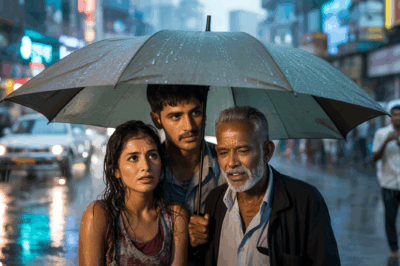The streets of Delhi glowed under the fading sunlight as Rajiv hurried home from his office job. The metro was crowded as always, filled with tired faces and restless energy, and he squeezed himself into a corner, clutching his worn-out bag. Inside the bag lay a stack of files he had carried back from work, proof that his office hours rarely ended when he stepped out of the building. His shirt was wrinkled, his tie loosened, and yet, his mind was still calculating deadlines and unfinished reports.
Rajiv was thirty-two years old, a middle-class man who lived in a modest flat in Lajpat Nagar with his wife Anjali and their six-year-old son Aarav. Life was a cycle of work, bills, and responsibilities, with little room for dreams. Yet, beneath his tired eyes lay a quiet determination to give his family the stability he himself had never known.
Every morning, he woke before sunrise, brewed tea in a steel kettle, and glanced at the pile of bills on the kitchen counter. Electricity, school fees, rent—each slip of paper carried its own weight. Anjali would rise soon after, preparing breakfast and lunchboxes, humming softly despite the constant worries that pressed on their shoulders.
Their son Aarav was the joy that made it all worthwhile. He loved cricket, often swinging a plastic bat in the living room, breaking cups and earning gentle scoldings from his mother. Rajiv would watch him sometimes, remembering his own childhood dreams of becoming a cricketer before poverty forced him to abandon them. Now he worked in a government office, handling paperwork for others, living a life of duty rather than passion.
One rainy evening, while Rajiv was waiting for a delayed metro, he noticed a man selling second-hand books under a broken umbrella. On impulse, Rajiv picked up a worn-out novel, something he hadn’t done in years. That night, after Aarav was asleep and Anjali was busy folding clothes, Rajiv opened the book and read by the dim light of their old lamp. For a moment, he felt transported away from the monotony of life, reminded that stories could breathe hope into weary hearts.
The next day at work, his colleague Sameer noticed the book on Rajiv’s desk. “You still read novels? I thought you were all about bills and files,” he teased. Rajiv smiled faintly, shrugging, but inside he felt a spark. Sameer laughed and said, “Careful, books make you dream. And dreams are dangerous for people like us.” The words stayed with Rajiv longer than expected.
Weeks passed, and life continued its usual rhythm. Rajiv’s office grew stricter about deadlines, his boss snapping at every mistake. Anjali worried constantly about Aarav’s studies, attending parent-teacher meetings where wealthier parents spoke casually of tutors and overseas plans. Rajiv sat silently in those meetings, feeling both protective and inadequate.
One night, Aarav asked him, “Papa, will you buy me a real cricket bat, not this plastic one?” Rajiv’s throat tightened. The real bat cost more than they could spare that month. He promised gently, “Soon, beta, very soon.” He watched disappointment flicker in his son’s eyes, and the weight of fatherhood pressed harder than ever.
That weekend, Rajiv accompanied Anjali to the market. As she bargained over vegetables, he noticed a young street performer juggling oranges, his laughter infectious despite the meager coins people tossed his way. Rajiv stood watching, struck by the contrast. The man had nothing, yet seemed free. Rajiv had everything he once prayed for—a stable job, a family—yet felt imprisoned by responsibility.
Anjali tugged his arm, bringing him back. “You’re lost again,” she said gently. He forced a smile, but she noticed the shadow in his eyes. Later that night, she asked quietly, “Are you unhappy with us?” Rajiv shook his head quickly. “No, it’s not that. I just… sometimes wonder if life could be different.” She said nothing, only placed her hand on his, and in her silence he felt both comfort and guilt.
As months turned into years, Rajiv’s routine deepened. Yet small moments began to stir change. He kept buying second-hand books, filling a hidden shelf in their home. He began writing short reflections in a diary, thoughts he never shared with anyone. He wrote about the crowds in Delhi, the smell of chai, the struggles of middle-class life, and the secret courage it required.
One day, Aarav discovered the diary. “Papa, you write stories?” he asked with wide eyes. Rajiv hesitated, then nodded. Aarav grinned. “Then you’re like the authors in my library books!” Rajiv laughed nervously, but that night, Anjali asked him softly, “Why didn’t you ever tell me you write?” He shrugged, embarrassed. “It’s nothing serious. Just thoughts.” But inside, he wondered if maybe it could be more.
Then came a turning point. His office announced restructuring, and Rajiv’s department faced heavy layoffs. For days, uncertainty hung in the air like smog. Rajiv worked harder than ever, but fear gnawed at him. Anjali sensed it, though he tried to hide it. Aarav, too young to understand, only asked why Papa was always late and tired.
When the final list was announced, Rajiv’s name was spared, but his closest friend Sameer was not. He watched Sameer pack his desk quietly, eyes hollow. “You’re lucky,” Sameer said with a bitter smile. “But don’t think luck lasts forever.” Rajiv carried those words home, feeling both relief and guilt. That night, he opened his diary and wrote with a new intensity, as if the words were his only refuge.
One evening, as he read a passage aloud absentmindedly, Anjali interrupted. “You should share these with others. They’re not just thoughts, Rajiv. They’re beautiful.” He laughed it off, but she insisted, and for the first time, he allowed himself to imagine it. Could his hidden words ever matter?
Encouraged by her, he submitted one piece anonymously to a local newspaper’s Sunday column. Weeks later, as he sipped his morning chai, he froze. His words were printed on the page, under the headline “Reflections from the Middle Class.” His heart pounded. Anjali’s eyes sparkled with pride as she whispered, “See? I told you.”
From then on, Rajiv began writing more seriously. He continued his job by day but poured his soul into words by night. Slowly, his pieces appeared more often in newspapers and magazines. People wrote letters appreciating his honest portrayal of everyday struggles. Rajiv felt alive in a way he hadn’t in years.
But success brought new dilemmas. His father, visiting from their village, frowned at the clippings Anjali proudly displayed. “Writing won’t feed a family,” he scolded. “Don’t waste your time.” Rajiv remained silent, torn between respect and rebellion. Later, Anjali whispered, “Ignore him. This is your gift.”
Meanwhile, Aarav beamed with pride at school, telling his friends, “My Papa is a writer.” For Rajiv, that simple sentence carried more weight than any paycheck.
Yet struggles continued. Bills still piled up, his office demanded endless hours, and Anjali often sacrificed her own desires to support his fragile dream. But in their small home, hope grew quietly.
One winter evening, Rajiv was invited to speak at a community event about his writing. Nervous, he stood before a modest crowd and read aloud from his diary. To his surprise, people nodded, clapped, even wiped tears. For the first time, Rajiv realized that his words could touch lives beyond his own.
Years later, Rajiv looked back at the path he had walked. He was still not rich, still living in the same small flat, still riding the crowded metro. But he was no longer just a tired office worker. He was a man who had found his voice, his courage, and his meaning.
Delhi had not changed. It was still loud, chaotic, unforgiving. But within its chaos, Rajiv had discovered the quiet strength of ordinary people, and in that strength, he found himself.
News
How a Middle-Aged Woman Rediscovered Her Passion, Reconnected With Her Dreams, and Transformed the Routine Life of Her Family
Anita woke up to the sound of birds singing outside her window. The morning sun filtered through the curtains, casting…
How a Young Villager’s Determination to Modernize His Hometown Transformed Lives, Traditions, and the Dreams of an Entire Community
Ravi woke up before sunrise, the faint glow of dawn illuminating his small room. He could hear roosters crowing and…
How a Small Village Friendship Between Two Girls Unfolded Into a Story of Trust, Courage, and Life-Changing Decisions
The sun rose over the quiet village, painting the small mud houses and green fields in golden light. Meera tightened…
Between Love, Respect, and Conflict, One Bride Learns Lessons of Patience and Family Secrets That Change Everything Forever
Meera stepped into her new home for the first time, her suitcase in hand and a mixture of excitement and…
A Young Woman’s Unexpected Journey Through Struggles, Love, and Hope That Changed Her Destiny in the Heart of Mumbai
The rain had been falling in Mumbai for three straight days, and the city seemed both alive and exhausted at…
When Strangers Share an Umbrella
Aarav left his small office building in Mumbai with a sigh of relief as the workday ended. The sky was…
End of content
No more pages to load












